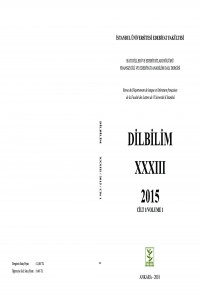Öz
ideology was confined to the sphere of politics and associated with the idea of
domination and alienation. Assuming a negative meaning, the term was often used
as an accusation: ideology was seen as a pathology that must be cured (Francfort
School, Aron, Arendt). Against this background, the Greimasian semiotic approach
implies that ideology is less of an evil or a deviation than a normal and inevitable
social phenomenon – even more, a basis for any purposeful and value-invested
human action. Although Greimas’s narrative semiotics uses the term in a strictly
metalinguistic sense, its significance transcends grammatical technicalities. It offers what Geertz was looking for – a nonevaluative approach. Leaving aside all
moral, accusatory or pejorative connotations of the term, it makes ideology an
analytical tool.
Anahtar Kelimeler
ideology myth imaginary semiotics Neo-marxism criticism of ideology Greimas Althusser Barthes
Kaynakça
- Althusser, L. (1965). Pour Marx. Paris : Maspero.
- Althusser, L. (1976). « Idéologie et appareils idéologiques d’État ». In L. Althusser, Positions (1964-1975) (pp. 67-125). Paris : Les Éditions sociales.
- Aron, R. (1976). Essai sur les libertés. Paris : Calmann-Lévy.
- Barthes, R. (1957). Mythologies. Paris : Seuil.
- Bell, D. (1997). La Fin de l’idéologie. Paris: PUF.
- Dumézil, G. (1995). Mythe et épopée. Paris: Gallimard.
- Geertz, C. (1973). The Interpretation of Cultures. New York: Basic Books.
- Greimas, A. J. (1966). Sémantique structurale. Recherche de méthode. Paris: Larousse.
- Greimas, A. J. (1970). Du sens. Paris: Seuil.
- Greimas, A. J. et Courtés, J. (1979). Sémiotique. Dictionnaire raisonné de la théorie du langage. Paris: Hachette.
- Greimas, A. J. (2017). Du sens en exil. Chroniques lithuaniennes (trad. de lithuanien L. Perkauskyté). Limoges : Lambert-Lucas.
- Landowski, E. (2007). Le papillon tête-de-Janus. A propos de Sémantique structurale, Actes Sémiotiques. 110. Récupéré de http://epublications.unilim.fr/revues/as/1540.
- Marx, K., Engels, F. (1952). L’idéologie allemande. Paris : Les Éditions sociales.
- Sverdiolas A. (Ed.) (2017). Algirdas Julius Greimas. Asmuo ir idėjos. Vilnius : Baltos lankos.
Ayrıntılar
| Birincil Dil | Türkçe |
|---|---|
| Konular | Dilbilim |
| Bölüm | Araştırma Makaleleri |
| Yazarlar | |
| Yayımlanma Tarihi | 25 Aralık 2018 |
| Yayımlandığı Sayı | Yıl 2015 Sayı: 33 |


